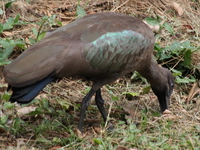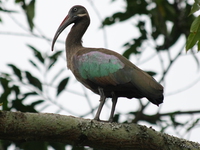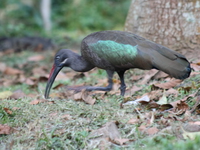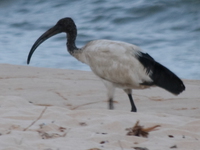hadada ibis
The hadada ibis has a distinctively loud and recognisable haa-haa-haa-de-dah call that is often heard when the birds are flying, hence the name.
Widespread and common throughout its large range, the Hadada Ibis is evaluated as Least Concern on the IUCN Red List of Threatened Species.
The Hadada Ibis, Bostrychia hagedash is a large, up to 76 cm long, dark brown ibis with a white "moustache", glossy greenish purple wings, large black bill with a red stripe on upper mandible, and blackish legs.
The Hadada Ibis is found throughout open grasslands, savanna and rainforests of Sudan, Ethiopia, Senegal, Uganda, Tanzania, Gabon, Zaire, Cameroon, Gambia, Kenya, Somalia and South Africa, and also in urban parks and large gardens. It feeds mainly on earthworms, using its long scimitar-like bill to probe soft soil. It also eats larger insects, such as the Parktown Prawn, as well as spiders and small lizards.
The Sacred Ibis (Threskiornis aethiopicus) is a species of wading bird of the ibis family, Threskiornithidae, which breeds in sub-Saharan Africa, SE Iraq and formerly in Egypt, where it was venerated and often mummified as a symbol of the god Thoth. It has also been introduced into France, Italy, Spain, United States (S.Florida) and Australia.
The bird nests in tree colonies, often with other large wading birds such as herons. It builds a stick nest often in a Baobab and lays 2-3 eggs.
The Sacred Ibis occurs in marshy wetlands and mud flats, both inland and on the coast. It will also visit cultivation and rubbish dumps. It feeds on various fish, frogs and other water creatures, as well as insects. An adult individual is 68 cm long with all-white body plumage apart from dark plumes on the rump. The bald head and neck, thick curved bill and legs are black. The white wings show a black rear border in flight. Sexes are similar, but juveniles have dirty white plumage, a smaller bill and some feathering on the neck.
This bird is usually silent, but occasionally makes some croaking noises.
The introduced and rapidly growing populations in southern Europe are seen as a potential problem, since these large predators can devastate breeding colonies of species such as terns. They also compete successfully for nest sites with Cattle and Little Egrets. The adaptable Ibises supplement their diet by feeding at rubbish tips, which helps them to survive the winter in these temperate regions.




